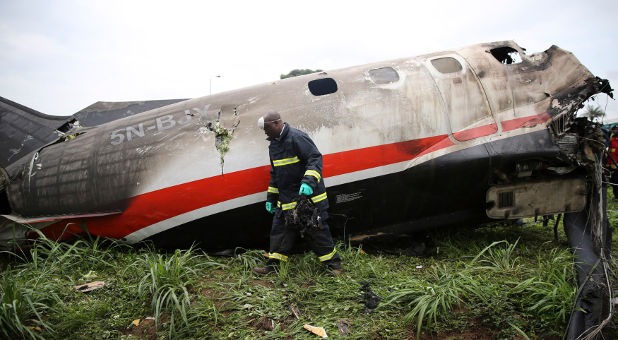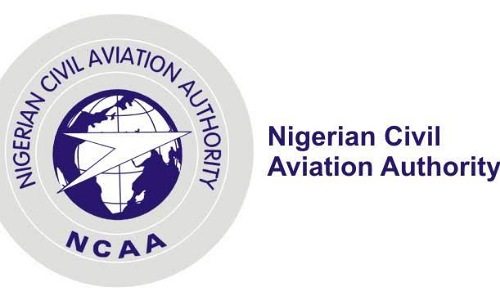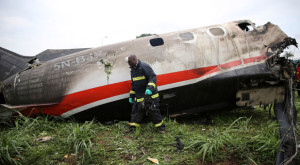Aviation
AIB blames pilots, others for four Nigerian plane crashes

LAGOS-THE Accident Investigation Bureau has indicted pilots of four crashed aircraft in the country as well as the Nigerian Airspace Management Agency and its Area Controllers in some of the locations were the accidents occurred.
The AIB stated this in the final report on the accidents that occurred within the Nigerian airspace, including that of the Beechcraft 1900D, with registration 5N-JAH belonging to Wings Aviation Services Air.
The others are the Cessna Citation 560XLS, with registration 5N-BMM, belonging to Bristow Helicopters; Boeing 737-500, with registration 5N-BLE, belonging to Aero Contractors; and AS 350 B2, with registration 5N-BHU, belonging to OAS Limited.
The AIB said the Beech 1900D aircraft was on a revenue positioning flight on March 15, 2008 and crashed at about 0920 hours in a mountainous terrain at Bushi Village, Obalinku Local Government Area of Cross River State. The bureau had on March 29, 2009 issued an interim report on the accident.
The final report stated that the aircraft deviated from the filed flight plan route and flew through the airway direct to Ikrop instead of Potgo-Enugu and Bebi direct, adding that the inputs into the Global Positioning System gave the crew different distances to Bebi. It stated, “The crew agreed on a coordinate to input, and thereafter were busy trying to locate the airstrip physically.
During this process, the Ground Proximity Warning System gave signals and sound of ‘Terrain, terrain… pull up, pull up’ several times without any of the pilots following the command. “The aircraft flew into the terrain and crashed. The flight crew and passenger were fatally injured. The airplane was destroyed and there was post-crash fire.”
The report noted that the Flight Data Recorder showed that the aircraft crashed at about 9.20am at an altitude of about 3,400ftm, while the plane flew for 103.75 minutes. It said the flight crew did not respond promptly to the GPWS warning, adding that they were not familiar with the route in a situation of low clouds, poor visibility and mountainous terrain.
The report also indicted the Area Controllers in the region of the crash, stressing that they “did not detect the estimates as passed by the pilot for position not in the filed flight plan.” Still on the contributory factors to the crash of the Beech 19000D aircraft, the AIB said “The erroneous co-location of Bebi airstrip and Obudu on the NAMA chart confused the crew.” Three persons were on the flight, the two flight crew members and one passenger, the report added.
On the Bristow Helicopters’ Cessna Citation 5N-BMM incident, the bureau said the flight departed Lagos at 1856hours for Port Harcourt on an Instrument Flight Rules and estimated Port Harcourt at 1940hours. It noted that on the final approach, the crew had visual challenge but continued the approach, crash landed and exited the runway.
The AIB stated, “The aircraft was cleared to maintain flight level 330. The aircraft made the first contact with Port Harcourt at 1914hours. The pilot reported maintaining FL330 with six souls on-board, four hours fuel endurance and estimating Port Harcourt VOR at 1940hours. “At 1921hours, the pilot reported 100 nautical miles to Port Harcourt and requested for descent. The aircraft was cleared or descent through different levels and finally cleared for the straight instrument landing system Approach Runway 21 and to report on the localizer. On final approach the crew were no longer visual but continued the approach, crashed landed and exited the runway.”
The investigation identified the causal factors of the crash to include “the decision of the pilot to continue the approach without the required visual reference.” It noted that other contributory factors were poor crew coordination, pairing two captains together and marginal weather condition. On the Aero Contractors Flight 210, a Boeing 737-500 registered as 5N-BLE, the report stated that the airplane skidded off the runway 28, while landing on approach into the Yakubu Gowon Airport, Jos, Plateau State. The aircraft departed Lagos on the fateful day with two pilots, three flight attendants and 87 passengers on board.
The AIB said, “The aircraft commenced an approach and touched down with the Right Main Wheel 135 metres from the threshold, skidded off the runway 28 to the left into the grass area, damaged three runway light assembles and uprooted the armoured cables at the airport. All 92 persons on-board sustained little or no injury, and the aircraft was substantially damaged.”
The causal factors were identified as the decision of the crew to continue the approach in an unstable condition, coupled with the captain’s inappropriate attempt to take over control of the aircraft. Other contributory factors include fatigue, which impaired the captain’s performance and reflected the effects of a long, demanding duty day associated with check airmen functions; poor crew resource management; and the prevailing weather condition.
On the OAS Limited aircraft 5N-BHU incident, the report stated that the helicopter was conveying the managing director and staff of a business firm to a meeting in Port Harcourt. After departing Lagos at about 0713hours, the aircraft could not continue the flight to Port Harcourt and was returning to the Osubi airstrip due to bad weather.
The report stated, “At 0904hours, the pilot could not give his position when requested by the Air Traffic Controller and collided with high tension cables belonging to the Power Holding Company of Nigeria located along the road to the Delta Steel Company in Delta State.” It added that three survivors were evacuated from the wreckage, while the fourth person was found fatally injured outside the aircraft. “One of the three survivors later died in the hospital,” the report stated.
The causative factor for the crash was identified as the “pilot’s decision to conduct the flight under a Special Visual Flight Rule in an Instrument Meteorological Condition as depicted by the weather forecast.” Contributory factors included “the pilot’s descent from 500ft without a clear visual reference and the pilot was not instrument rated.”
Speaking on the outcome of the report, the Commissioner/Chief Executive Officer, AIB, Dr. Felix Abali, said the bureau would ensure unbiased investigations into aircraft accidents and serious incidents. “At the AIB, we are committed to enhancing aviation safety by conducting thorough and unbiased investigations into aircraft accidents and serious incidents. We are currently working hard to release more accident reports in the shortest possible time,” Abali added.
PUNCH-
Aviation
JUST IN: NCAA Suspends 3 Jet Operators

The Nigerian Civil Aviation Authority (NCAA) has taken action by suspending the permits of three private jet operators due to their involvement in commercial flights.
Chris Najomo, the Acting Director General of the NCAA, issued this suspension during a briefing to all airlines on Tuesday.
Additionally, Najomo ordered a re-evaluation of all PNCF permits within a 72-hour timeframe.
The head of the NCAA stated that Festus Keyamo, the Minister of Aviation and Aerospace Development, had instructed the discontinuation of private jets’ commercial use in 2023.
Despite this directive, the operators persisted in their commercial activities.
Najomo said “Subsequently, in March 2024, the NCAA had issued a stern warning to holders of the permit for non commercial flights, PNCF, against engaging in the carriage of passenger cargo or mail for hire and reward.
“The Authority had also deployed its officials to monitor activities of private jets at terminals across the airports in Nigeria.
“As a consequence of this heightened surveillance, no fewer than three private operators have been found to be involved in violation of the annexure provision of their PNCF and Part 9114 of the Nigeria Civil Aviation Regulations 2023.
“In line with our zero tolerance for violation of regulations, the Authority has suspended the PNCF of these operators.”
Aviation
Keyamo Charges NCAT To Produce 4,203 Controllers By 2037

Minister Festus Keyamo has urged the Nigerian College of Aviation Technology in Zaria, Kaduna State, to create new solutions that can speed up the training of skilled air traffic controllers.
This call comes as Africa anticipates a need for 4,203 new air traffic controllers by the year 2037.
The minister made this statement on Wednesday during the 34th IFATAC Africa and Middle East Regional meeting in Abuja.
Addressing the gathering, the minister noted that the goal of training 4,203 new air traffic controllers aligns with the projection from the International Civil Aviation Organization (ICAO).
He further affirmed the ministry’s commitment to offering full support to NCAT, ensuring it not only meets but surpasses its mandated duties and roles.
He said “ICAO projects that by the year 2037, Africa will require 4,203 new air traffic controllers. The onus rests on the Aviation College of Aviation Technology (NCAT) to develop innovative ideas solutions to accelerate the training of new and proficient air traffic controllers.
The minister, represented by acting director Michael Chiko from Air Safety and Administration, highlighted the rapid evolution of the air traffic control profession.
He stated “The profession of air traffic control has evolved rapidly, transitioning from simple flag signalling to sophisticated technologies. This evolution facilitates management of the surging number of aircraft traversing our
skies daily.
“As a vital, indispensable component of air safety, air traffic controllers are responsible for the safe, orderly and expeditious flow of air traffic. Therefore, I am not unaware of the critical role you play and invariably, the heavy burden you bear.
“This burden is compounded by increased air traffic, workforce shortages, technological shifts; necessitating rigorous training regimes.
“More so, with the emergence of unmanned aerial vehicles, reshaping dynamics and challenging the norm, it is thus paramount to prepare for the future and indeed Nigeria like other countries must prepare for the future.” he added
During the event, Mr. Lawrence Pwajok, representing Engr. Mohammed Odunowo, the managing director of the Nigerian Airspace Management Agency (NAMA), emphasized the relevance of the 34th IFATCA Africa and Middle East Regional meeting’s theme, titled ‘Shaping the Future: Trends and Insights On ATC Training for Tomorrow’.
Pwajok highlighted the significance of this theme, especially as air traffic control commemorates 100 years since its inception.
He suggested examining the historical perspective of air traffic control, tracing its origins from Croydon airport a century ago to its present form in modern airports like Dubai, Istanbul, JFK, Charles De Gaulle, among others.
This historical comparison aims to provide insights into the potential trajectory of the future air traffic control system over the next century.
He added “It is obvious that the future air traffic management system will be characterised by extensive application of automation, digitization and artificial intelligence.”
Aviation
Airlines Must Pay Compensation For Flight Disruptions – Keyamo

Festus Keyamo, the Minister of Aviation and Aerospace Development, underscored the obligation for airlines to provide compensations in cases of flight cancellations and delays.
Festus Keyamo conveyed this directive during a meeting with the heads of agencies affiliated with the ministry on Tuesday.
He said, “We are not deaf to the cries of Nigerians about delays and canceled flights. The law is there and we are looking at how to enforce those laws for compensation of Nigerians who bear the brunt of cancellation of flights and disrupting the activities.
“The process of grounding the airline or taking the airlines to court will create more problems.
“So if the reason for the delay and cancellation of flight is their fault they must pay compensation. And what I am suggesting is that if they don’t get cash back they must get some rebate when they buy next ticket.
“I have set up a committee to look into it such that they can generate a code that they can use when they want to purchase the next ticket.
“We are concerned about the passenger satisfaction and the safety of the air travelers,” he said. The minister directed the Director-General of the Nigerian Civil Aviation Authority to prepare a weekly catalogue of canceled flights.
He further instructed the Nigeria Safety Investigation Bureau to finalize investigations into all air accidents and mishaps within the upcoming 10 days.
He said: “For the recent incidents that happened recently, some minor, and others classified as serious incidents although there were no fatalities. The NSIB is investigating these incidents and I have directed them that within 10 days from today they must submit their report of the incidents and what actually transpired.” he added














